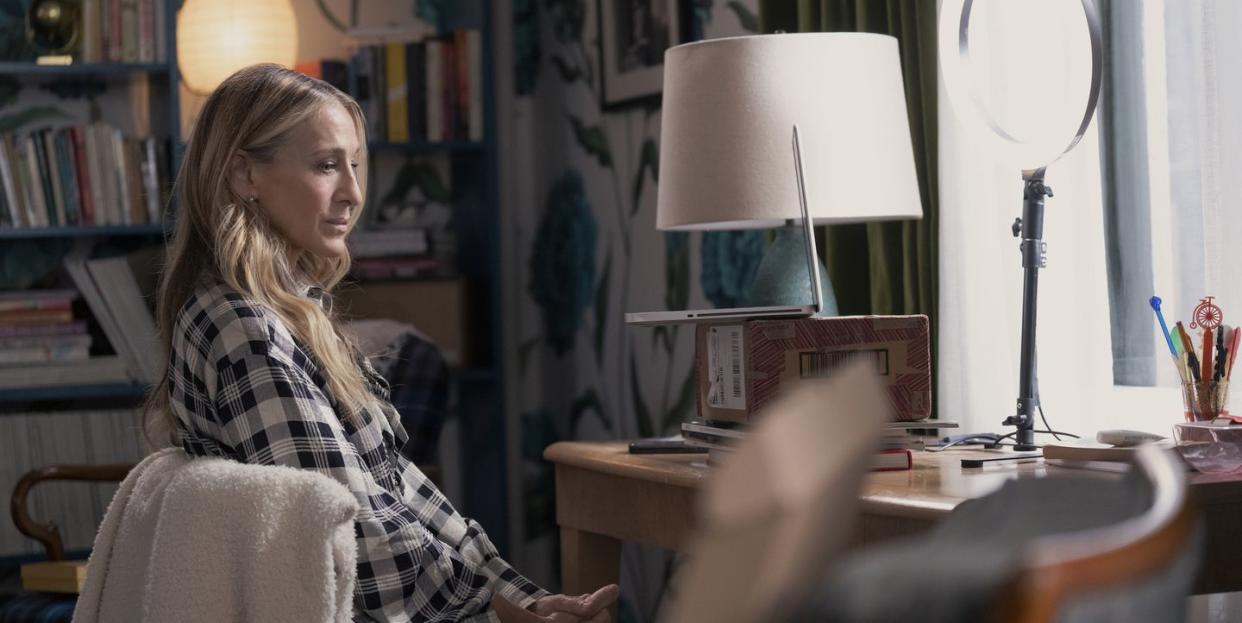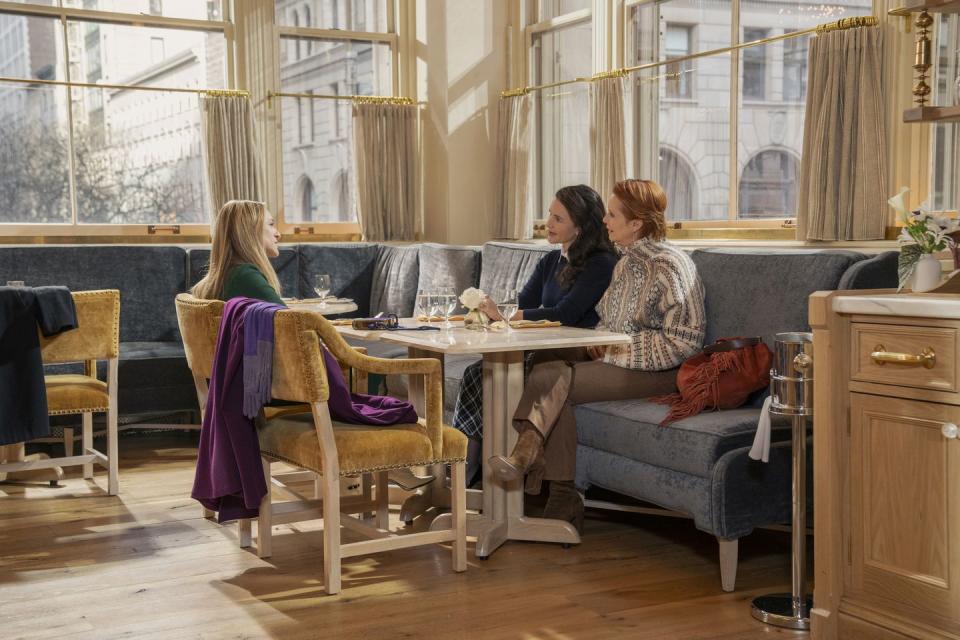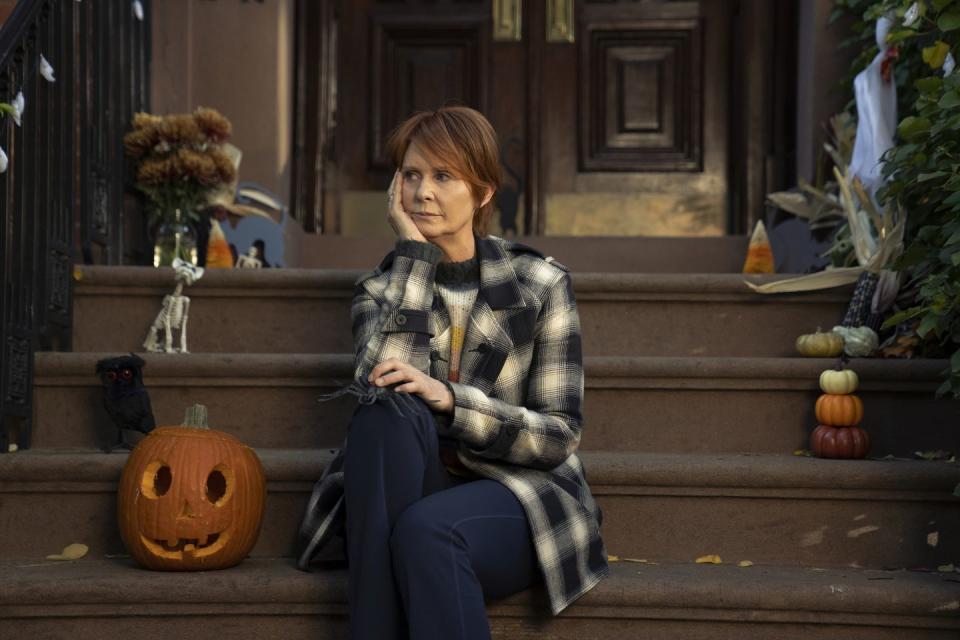How “Sex and the City” Betrayed Its Inner Cynic

- Oops!Something went wrong.Please try again later.
"Hearst Magazines and Yahoo may earn commission or revenue on some items through these links."
There is a moment from the second season of And Just Like That…, HBO’s “next chapter” of Sex and the City, that I can’t stop thinking about. In the fourth episode, Carrie Bradshaw and longtime bestie Miranda Hobbes are at Che Diaz’s apartment. In case you missed the collective hoopla from last season, Che—a bisexual, nonbinary comedian who befriended Carrie when the pair were on a podcast together—is in a relationship with Miranda, who has ditched her fan-favorite husband, Steve.
Boxes of Ikea furniture are everywhere in the apartment, and on the newly assembled bed, a group discussion of everyone’s sexual history ensues. After a few drinks, Che describes having briefly been in a polyamorous relationship with their ex-husband Lyle—a Malibu mixologist who is also attending this makeshift housewarming, for some reason—and a girlfriend. At this point, I expected Miranda—formerly SATC’s chief cynic, never afraid to share her often brutal opinions—to say something witty. Probably about how she was barely able to tolerate one romantic partner in her life, let alone several at a time. Perhaps Carrie would interject with something like, “And I couldn’t help but wonder … what about polyamor-ME?” But no. Instead, Miranda turns to Carrie with a look I can only describe as simpering awe. “Meanwhile,” she says, “I was cutting up carrot sticks for Brady’s lunch box.”
To me, this moment sums up a problem with the revival series: The show has lost the cynicism that helped make Sex and the City a cultural phenomenon.
It might sound strange to highlight cynicism as part of SATC’s legacy. After all, the original series ended like a rom-com: Carrie was whisked off her feet in Paris by the love of her life, Mr Big. Charlotte finally got her baby. Samantha was cancer-free and coupled-up with a movie star. Miranda got married (albeit “unconventionally”) to Steve.
But re-watching the original series in preparation for AJLT—a now-yearly ritual that is part pleasure, part preemptive trauma response—I realized that, particularly in the earlier seasons, SATC was a very cynical show. Its four protagonists were originally bound together by the fact that they were childless and single. Already outcasts from convention, they were often critical of society’s expectations of them.
In the original SATC friendship quad, there was a carefully balanced mix of romanticism and cynicism. Charlotte was the most traditional of the group: She wanted nothing more than to settle down with a husband and kids, and had done so by the end of the series.
Then there was Carrie—so idealistic she ran off to Paris in the pursuit of “can’t live without each other” love. Before that, though, she was slightly more of a realist. “In a city of great expectations, is it time to settle for what you can get?” she asked in her column, after discovering in the first season that Big never wanted to get married again. “Can you ever really escape from your past?” she asked in season three. (Answer: Probably not.) Then there was my personal favorite, from season two: “Are all men freaks?” (Answer: Probably, yes.)
If Charlotte and Carrie erred on the romantic side, then they were balanced out by Samantha—a sex-positive PR maven who was perfectly happy without children or, until the final season, a boyfriend. Samantha’s most important relationship was with herself and that was just the way she liked it.
Then there was Miranda, the hotshot corporate lawyer who was always there to bring someone like Charlotte back down to earth. In season six, when Charlotte debuted her theory that “everything happens for a reason,” Miranda’s response was: “That’s total bullshit.” She was similarly disapproving when Charlotte gave up her career as a gallery director to focus on starting a family with her ex-husband Trey. Miranda was also the only person who told Carrie her plan to go to Paris with Russian artist Aleksandr Petrovsky was a bad idea. “You’re living in a fantasy!” Miranda screamed at her—and she was right.

The problem now is that the important cynic-to-romantic ratio is all off in AJLT. Kim Cattrall will make an anticipated cameo in the season two finale, but the show has been missing Samantha’s running commentary on the characters’ lives. Not only that, but the new direction of Miranda’s character has removed so much of the confidence and bite that made fans love her. Perhaps this is an attempt to represent what happens to some women as they get older, but the show has suffered for it. The loss of the two leading cynics is a void that no amount of zingy one-liners from new characters like Seema Patel or the newly elevated Anthony Marantino can fully compensate for.
If I think back to Miranda’s comment about chopping up carrot sticks, what annoyed me most was how untrue it felt. No, you weren’t! I wanted to scream at the TV. Miranda famously relied on her nanny and housekeeper, Magda, to help with domestic tasks while she was busy with work. Furthermore, she was on Sex and the City—you know, the TV show about the adventurous sex lives of hot Manhattan women? Even after Miranda had a baby, we saw her using a vibrator—borrowed from Samantha, of course—to get him to sleep. In season six, she insisted she “hates children that aren’t her own” and agreed with Samantha that babies should be banned from New York’s chic lunch spots. The new scene with Che felt like an effort to rewrite Miranda’s narrative—to make her sanitized and pedestrian not only today, but also in her past. It baffled me.
I found another scene, this one from the fifth episode, similarly at odds with the Miranda I know. Having gotten up at 5:00 a.m. to wake up her son, Brady—now a work-shy and dramatic Gen Z stereotype—we find Miranda in the kitchen manically carving a pumpkin, because “Halloween spirit” is suddenly important to her. It’s a far cry from the first SATC movie, when Miranda mocked parents who were into Halloween, describing them as “nonworking mothers with nothing else to do all day,” before complaining that “witch and hot kitten” were the only costume options for women. “You just said a mouthful there, sister,” said Carrie—this time, she was right.
The first SATC movie (we dare not speak of the second) represented the accelerated rom-com-ification of the franchise. Suddenly, everyone was super rich and, at the end, Carrie ran back into Mr Big’s arms in the middle of a perfect closet he’d somehow defied the space-time continuum to build her.
In 2018, during her run for New York governor, actor Cynthia Nixon—who plays Miranda—said she was “devastated” when fans applauded that pivotal closet scene at the premiere of the film. “The show was so much about female empowerment and about women making their own choices and women standing up for what they wanted and supporting themselves,” she told Wendy Williams. “So, to me, to have this [scene] be a climax of the film, that your very wealthy husband built you a really nice closet for your clothes, I thought, Wow, that’s not really what you love about the show, is it?”

It’s an astute observation—one the old Miranda would probably have made, too. But watching AJLT, I find myself feeling the same way a lot of the time. To answer Nixon’s question, part of the problem is that fans have drastically different recollections about what they loved about SATC. Some have a false memory that the show was just four women drinking cosmopolitans and talking about their vaginas over expensive salads. But alongside the fab fashion, hot sex, and sweaters kept in stoves, there also were a lot of lows: divorce, death, loneliness, and cancer. What made SATC a cultural phenomenon was that it had a fearlessness about how it tackled the tensions in its characters’ lives. This resulted in a lot of poorly aged episodes, for sure, but it also created a language that its audience—particularly women and gay men—hadn’t encountered before on TV.
Throughout AJLT, on the other hand, there is a lingering feeling that the show is fearful of its audience, or of saying the “wrong” thing. In episode five, when Miranda said Steve and Brady would “probably starve” if she didn’t wake up at 5:00 a.m. to travel to Brooklyn to make them breakfast every morning, I wanted Samantha to get on the next flight from London to give her a reality check. I wanted Miranda to hurl that pumpkin on to the kitchen floor and tell her son to start making his own fucking breakfast.
There’s a self-referential moment in the same episode, when a focus group completely tears apart the fictionalized version of Che played by Che Diaz in the comedian’s sitcom pilot. A genderqueer person from Brooklyn likens Che to “a walking boomer joke,” saying they’re “just some phony, sanitized, performative, cheesy, dad-joke bullshit version of what the nonbinary experience is” as a horrified Che looks on. The scene seems designed to acknowledge some of the real-world criticism of Che—of which there has been a lot—particularly from LGBTQ+ viewers themselves. Watching it, my prevailing thought was: Why isn’t this icon from the focus group friends with Carrie?! Their brutal honesty is a breath of fresh air when most of the characters on AJLT—even Miranda—now feel like wooden yes-people.
In the latest episode, we are briefly reacquainted with the old Miranda. After a huge argument with Steve—the best scene of the season so far—Miranda discovers he’s been sleeping with a woman who works at Whole Foods. Strutting out of his bedroom, she congratulates him on his “locally sourced organic sex,” and says she’ll get to work on the divorce papers. Zing! We also see Carrie being dragged to “Widow Con” by a hilariously passive-aggressive friend from her past, as well as Che recording Cameo videos in their bedroom, highlighting the bleakness of internet fame.
These glimpses are bittersweet, because they’re a reminder of what the show seems to have forgotten: Fans loved SATC because its characters weren’t afraid of saying that something or someone was total bullshit. Carrie Bradshaw’s world needs to rediscover its inner cynic—and to trust its audience enough to sometimes tell us things we don’t want to hear.
You Might Also Like

